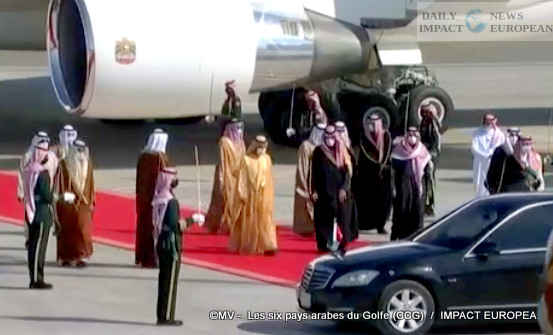Qatar and the four Gulf countries that boycotted it for more than three years have restored diplomatic relations.
Saudi Arabia, Oman, Kuwait, Bahrain, United Arab Emirates and Qatar have ratified documents to join forces and promote their region.
The four Arab countries boycotting Qatar decided on Tuesday to reestablish full diplomatic relations with Doha, ending more than three years of isolation for the Gulf country which was accused of defying its neighbors.
« It was decided today, thanks to the wisdom of leaders of the Gulf and Egypt, to turn the page and restore all diplomatic relations » with Qatar, Prince Faisal bin Farhane Al told reporters. -Saoud, head of Saudi diplomacy, after a Gulf summit.
Saudi Arabia and three allied countries – the United Arab Emirates, Bahrain and Egypt – severed diplomatic relations with Qatar in June 2017, accusing it of supporting Islamist groups, of getting along too much with their Iranian and Turkish adversaries or to stir up trouble in the region. The Qataris, who have always denied, said they were victims of a « blockade » and an attack on their sovereignty.
« The efforts (of Kuwait and the United States) have helped us to obtain an agreement (…) where we affirm our solidarity and the stability of the Gulf and of the Arab and Muslim countries, » Saudi Crown Prince Mohammed bin Salman announced to the opening of the summit in Al-Ula (north-western Saudi Arabia).
Hopes for reconciliation between Qatar and its neighbors were rekindled the day before after Saudi Arabia reopened its borders with that country on Monday.
The six Arab Gulf countries have signed a « solidarity and stability » agreement, Saudi Crown Prince Mohammed bin Salman said at the opening Tuesday of the annual summit of this regional grouping intended to end a dispute of more than three years with Qatar.
“Today there is an urgent need to unite our efforts to promote our region and to face the challenges that surround us, in particular the threats posed by the Iranian regime’s nuclear and ballistic missile program and its sabotage plans and destruction, ”he added.
The leaders of the six Gulf Cooperation Council (GCC) countries then signed two documents: the Al-Ula Declaration, where the summit is taking place in northwestern Saudi Arabia, and a final communiqué.
The Saudi Crown Prince then reunited with the Emir of Qatar, Sheikh Tamim bin Hamad Al-Thani. A bilateral meeting devoted, according to the official Saudi press agency SPA, to « the development of relations between the two countries and the joint action of the Gulf countries ».
The summit got off to a good start after the announcement on Monday evening by Kuwait, acting as mediator, of Saudi Arabia’s reopening of its airspace and all of its borders in Qatar.
The GCC was born 40 years ago with the ambition to bring together politically, economically and militarily its members – Saudi Arabia, Bahrain, United Arab Emirates, Qatar, Oman and Kuwait. The appearance of the Emir of Qatar at the summit was another sign of an imminent appeasement of relations.
The United States has pressed for this reconciliation in order to further isolate Iran, as part of its strategy of « maximum pressure » on Tehran.
Mohammed ben Salman assured that the aim of the summit was to stand together in the face of « challenges », in particular « the Iranian nuclear program, its ballistic missile program and its sabotage projects ».
Iranian Foreign Minister Mohammad Javad Zarif reacted on Tuesday by congratulating Qatar on « resisting pressure » and assuring its « other Arab neighbors that Iran is neither an enemy nor a threat », calling on them to accept Iran’s “offer” “for a strong region”.
The break with Doha was accompanied by retaliatory measures: closing the borders and airspace to Qatari planes and restricting Qatari travel, which sometimes led to the separation of families.
Doha did not comply with any of these demands. But the media in Saudi Arabia and Qatar, usually so bitter towards the opposing camp, have changed their tone drastically. Diplomats and specialists, however, question a rapid and complete standardization.
The quartet had formulated thirteen conditions for the resumption of relations, including the closure of Al-Jazeera, a channel hated by many Arab regimes, commitments to end the funding of extremist groups or the closure of a Turkish military base in Qatar.
The United Arab Emirates in particular remains particularly cautious, due to Doha’s proximity to the Islamist brotherhood of the Muslim Brotherhood. The latter did not fail to welcome the rapprochement between Qatar and its neighbors through their spokesperson in Istanbul, Talat Fahmy. But reconciliation does not necessarily mean a change in policy.
« We could see some readjustments at first to maintain the deal and show goodwill, but that does not mean that Qatar will change or try to undo the policies it has maintained in recent years, » he said. pointed out Eman Alhussein, researcher at the Arab Gulf States Institute in Washington.
« Like any reconciliation, it will be fraught with pitfalls and likely to lead to deadlock and tensions, » Bader al-Saif, assistant professor of history at Kuwait University, told AFP. We must expect, he added, « difficult talks » between countries with « interests considered to be conflicting ».
Qatar and the four Gulf countries which boycotted it for more than three years have reestablished their diplomatic relations, thanks to “the efforts (of Kuwait and the United States) have helped us to obtain an agreement (…) where we affirm our solidarity and stability in the Gulf and in the Arab and Muslim countries, ”the Saudi Crown Prince Mohammed ben Salman announced at the opening of the summit in Al-Ula (north-west of Saudi Arabia).
Views: 0














More Stories
Phenom 300E: The World’s Leading Light Jet for 14 Consecutive Years
Art Capital, 20 Years Already
Chers Parents Premieres in Paris